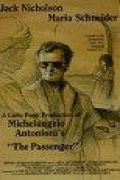
France/Italy/USA/Spain 1975
Directed by
Michelangelo Antonioni
126 minutes
Rated M
Reviewed by
Bernard Hemingway

The Passenger
Synopsis: David Locke (Jack Nicholson) is a television reporter investigating an insurrection against the dictatorship of an African country. When he finds an acquaintance dead of a heart attack in the room next door at his hotel, he switches passports. Although liberated from his former life he finds out that the man whose identity he has adopted was a dealer selling arms to the rebels and he decides to learn more.In Genesis, when God is casting Adam out of the Garden of Eden and into the world of toil for having eaten of the Tree of Knowledge of Good and Evil, he bids him adieu with the words “…for dust thou art, and into dust thou shalt return” (3:19). Such words would make a fitting epitaph to Antonioni’s 1975 film which is largely set in the bone-dry landscapes of North Africa and southern Spain and presents a kind of accelerated history of personal alienation.
The Passenger belongs to Antonioni’s later career with the film for which he is best known in the English-speaking world, Blow-Up. It is, like that film, a thriller of sorts, with a narrative built around a cat and mouse pursuit but one which pushes the conventionally-prominent action to the margins and concentrates instead on the extended passages of time between events. As such it is a meandering, often seemingly empty affair but more importantly a metaphor for Antonioni’s view of life itself, which is to him a journey in search of meaning, one which is made up of a mix of choice, arbitrariness, coincidence and fate.
As is so often the case with Antonioni’s films, the landscape is a critical player in his representation and here it is an indifferent divinity. Antonioni, with the aid of his cameraman, Luciano Tovoli, creates some extraordinarily telling imagery, whether it is of the bone dry inhospitableness of the country or of the rough hewn man-made structures within it (he also uses Gaudi’’s Casa Milà to great effect). It is not easy to think of a film in which physical space is used so effectively to carry the director’s meaning. This use of the conjunction between the natural and man-made, and indeed Antonioni’s inversion of the conventional action/inaction ratio, is nowhere more stunningly brought together than in the penultimate scene through the barred ground floor window of Locke's hotel room. It is a masterful scene and one of the most memorable in cinema history.
The screenplay by Antonioni with Mark Peploe, who has worked a lot with Bertolucci, and film theorist Peter Wollen is suitably restrained and peppered with existential world-weariness (The Girl: “People disappear every day”; David Locke: “Every time they leave the room”). Maria Schneider, who had come to fame in Bertolucci’s Last Tango In Paris (1972), and who was a quintessential '70's pin-up is probably too pretty for the role and her part underwritten but had she been a more fitting partner for Nicholson’s Locke/Robertson character the film may well have proven too unwieldy and we would have lost its strength which lies primarily in its non-verbal tone and texture.
The Passenger is a remarkable film, albeit one which will reward the more reflective film-goer.

Want more about this film?


Want something different?




